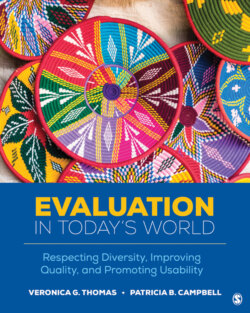Читать книгу Evaluation in Today’s World - Veronica G. Thomas - Страница 17
На сайте Литреса книга снята с продажи.
Definitions of Evaluation
ОглавлениеWhile for the general public there is a fairly consistent definition of evaluation, that is not the case for evaluators. As Mark, Greene, and Shaw (2006, p. 6) point out, “If you ask 10 evaluators to define evaluation, you’ll probably end up with 23 different definitions. Given that evaluation is diverse, with multiple countenances, it should not be surprising that varying definitions exist.”
Definitions of evaluation from leaders in the field, from the 1980s and 1990s, focused on evaluation as a way of determining value. For example, Michael Scriven, in 1991, defined evaluation as “the process of determining the merit, worth, or value of something, or the product of that process” (p. 139). Several years earlier, Yvonna Lincoln and Egon Guba (1985) defined evaluation as “disciplined inquiry” with a goal of determining value for program improvement or refinement. Their definition also made a distinction between formative evaluation (to determine the value of a project, program, or product in order to improve or refine it) and summative evaluation (to determine the worth, value, and/or success of a project, program, or product), both of which are discussed in further detail in Chapter 6. In 1997, Michael Quinn Patton went a step further in his definition, adding that the information collected in evaluation could be used to inform decisions about future programming as well as “to make judgments about the program [and] improve program effectiveness, and/or inform decisions about future programming” (p. 23). Trochim’s (1998) definition includes providing evidence in decision making and contexts as well. It also describes those contexts as “inherently political” and as involving “multiple and often conflicting stakeholders, where resources are seldom sufficient and where time pressures are salient” (p. 248).
More recent definitions (e.g., Newcomer, Hatry, & Wholey, 2015; Rossi, Lipsey, & Henry, 2019) refer explicitly to social science methods, with Rossi et al. (2019) including in their definition a reference to context and an explicit goal to “inform social action to improve social conditions” (p. 6). While myriad descriptions of evaluation are found in the literature, consistent across them is the idea that evaluation is a systematic, applied inquiry process for collecting and synthesizing evidence (data) and drawing conclusions about the state of affairs, value, merit, worth, significance, or quality of an entity.
The focus on value is key to understanding what evaluation is. Value is the “feature that distinguishes evaluation from other types of inquiry, such as basic science research, clinical epidemiology, investigative journalism, or public polling” (Fournier, 2005, p. 140). Unlike research, evaluations do not simply report outcomes; they draw conclusions about the value or quality of those outcomes within a particular context and for specific groups. Program evaluation, in particular, involves the use of research methods to examine a program’s goals, objectives, outcomes, and impact. It can also be used to investigate a program’s structure, characteristics, activities, organization, and political and social environment. Evaluation has the potential to enable society to meaningfully learn about its persistent social problems and how to effectively solve them (Cronbach et al., 1980).
Our definition of evaluation encompasses many of the components in the earlier definitions. It includes systematic inquiry, assessing value and awareness of context, and also ethical, quality, justice, and cultural concerns. We define evaluation as a
disciplined inquiry involving the systematic, contextually responsive, and ethical application of research tools and methods to collect data that assess the effectiveness and operations of programs within the various social, political, and cultural contexts in which they operate. Evaluation’s ultimate goal is to provide credible evidence that fosters greater understanding and improves decision making, all aimed at improving social conditions and promoting healthy, just, and equitable communities.
